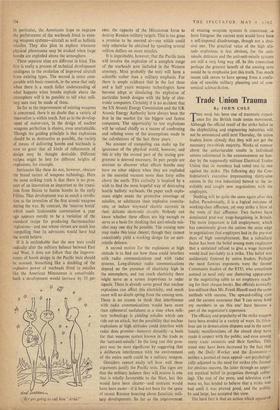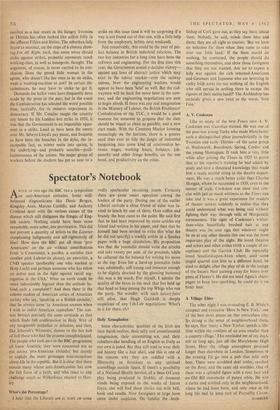Trade Union Trauma
By JOHN COLE
Tins week has been one of traumatic experi- ence for the British trade union movement. Although the official result of the strike ballot in the shipbuilding and engineering industries will, not be announced until next Thursday, the union leaders know already that they will not get the necessary two-thirds majority. Weeks of rumour about the unfavourable results in individual unions culminated in the announcement on Sun- day by the supposedly militant Electrical Trades Union that its members had voted two to one against the strike. The following day the Con- federation's executive (representing thirty-nine unions in the two industries) bowed to the in- evitable and sought new negotiations with the employers.
Nothing will be quite the same again after this ballot. Paradoxically, it is a logical outcome of working-class affluence, yet may strike a blow at the roots of that affluence. Two factors have dominated post-war wage-bargaining in Britain. The more important is full employment, which has consistently given the unions the same edge in negotiations that employers had in the pre-war days of high unemployment. But a subsidiary factor has been the belief among most employers that a sustained refusal to give a wage increase would lead inevitably to a strike. This belief was assiduously fostered by union leaders. Perhaps the most famous exponents were the former Communist leaders of the ETU, who sometimes seemed to need only one shattering appearance at the negotiating table to set employers reach- ing for their cheque books. But officials avowedly less militant than Mr. Frank Haxelt used the same methods with success. The upward-rolling eyes and the earnest assurance that '1 can never hold my members in on this one' have become a part of the negotiator's repertoire.
The efficacy and popularity of the strike weapon have been eroded in a variety of ways. Its frivo- lous use in demarcation disputes and in the more lunatic manifestations of the closed shop have made it suspect with the public, and even among many trade unionists and their families. This trend may have been increased by the fact that only the 'Daily Worker and the Economist — neither a journal of mass appeal—are psychologi- cally adjusted to the need for strikes (the former for obvious reasons, the latter through an appar- ent mystical belief in purgation through suffer- ing). The rest of the press, and television even more so, has tended to believe that a strike was bad until it was proved good, and the public, by and large, has accepted this view. The hard fact is that an action which appeared justified as a last resort in the hungry Twenties or Thirties has often looked like selfish folly in the affluent Fifties and Sixties. The suburban lady heard to murmur, on the steps of a cinema show- ing l'in All Right, Jack, that more wives should strike against strikes, probably represents much working-class, as well as bourgeois, thought. The argyment, of course, is never carried to its con- clusion. Does the proud little woman in the apron, who doesn't like her man to be on strike, want a washing-machine or not? In certain cir- cumstances, he may have to strike to get it.
Demands for ballot votes have frequently been made by the press in the past, but in the event the Confederation has selected the worst possible time, tactically, for its massive experiment in democracy. If Mr. Cousins taught the country any lesson by his London bus strike in 1958, it was that the Government is an impossible oppo- nent in a strike. Loud as have been the sneers over Mr. Selwyn Lloyd's pay pause, and frequent as have been the breaches in the dyke, the in- escapable fact, as winter melts into spring, is the underlying—and probably sensible—pusil- lanimousness of the unions. No major group of workers before the dockers has got so near to a strike on this issue (and it will be surprising if a way is not found out of that one, with a little help from the employers, before next weekend).
Just conceivably, this could be the year of per- fect balance in British industrial relations. The two key industries for a long time have been the railways and engineering. For the first time this year, the Government scored a decisive victory— against any laws of abstract justice which may exist in the labour market—over the railway unions. Now the engineering workers would appear to have been 'held' as well. But the rail- waymen will be back for more later in the sum- mer, and the engineering negotiations are now to begin afresh, If there was any real imagination in the Ministry of Labour, the British Employers' Confederation or the TUC, it would be a good moment for someone to propose that the slate should be wiped as clean as possible, and a new start made. With the Common Market looming menacingly on the horizon, there is a greater need than ever to tidy the jungle of industrial bargaining into some kind of relationship be- tween wages, working hours, holidays, job- security and other fringe benefits, on the one hand, and productivity on the other.







































 Previous page
Previous page